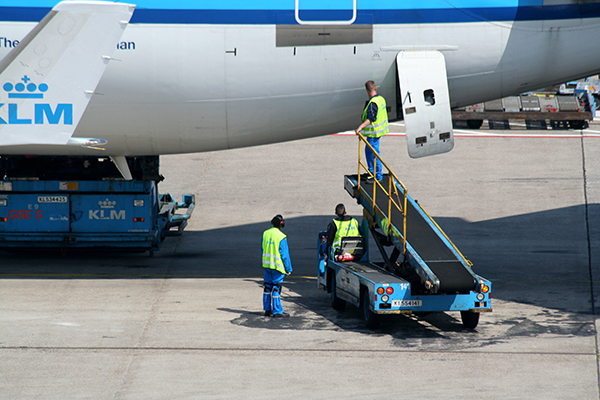‘Dear passengers, please fasten your seat belts as we are ready for departure.’ Many travelers did not get a chance to hear these famous words, as their flights were canceled due to the unannounced strike by KLM baggage and freight personnel at Schiphol airport on 23 April. The strike was a result of staff shortages creating chaos and delays at one of the busiest airports in the world.
Into the second week of the May school holiday, the long queues and large crowds at the airport continued, resulting in significant delays for travelers. The strike on 23 April started when ground staff, responsible for loading and unloading planes and bringing luggage to the baggage belts, received an email stating that their work would be partially outsourced to another handling agent. This was the last straw in an ongoing conflict between Schiphol and the ground staff over low pay, poor working conditions and no permanent contracts. According to KLM, labour shortages and a high levels of callouts are the reasons for its decision to outsource.
The strike has now ended and unions are making endeavours to reach an agreement with KLM management. With the airport still suffering from staff shortages, the airport authority has called on various airlines to cancel flights in order to control the situation and prevent excessive crowds. Agreeing to the suggestion, KLM canceled more than 40 fights, while other airlines such as Tui, Transavia and Corendon rerouted flights to other airports in the Netherlands. These initiatives act as a breather for the country’s largest airport, but the number of flight diversions is limited by various factors, including rules about noise pollution.
Despite the schedule changes, Schiphol has warned people to expect waiting times longer than usual, especially at the security check: due to staff shortage, only eight out of fourteen lanes are open on the busiest days of the year. Journalist Molly Quell from DutchNews shared her traveling experience: it took her 2 hours and 40 minutes to get through security, with the queue starting outside the terminal building. Flight cancellations just lead to more problems: many travelers are demanding a refund for Schiphol pouring cold water on their travel plans. Since the strike, over 1600 claims for damages, worth 1.3 million euros, have been received. The authorities believe this is the tip of the iceberg, as many more claims will be reported once travelers return from holiday.
Mark Harbers, State Secretary for Infrastructure and Water Management, sees the problems at Schiphol as a serious issue, caused by staff shortage. This is in fact a common problem that is prevalent beyond the aviation sector and is not easily solved by throwing more money at it. The Netherlands is experiencing staff scarcity in all sectors, with technology and IT, construction, teaching, healthcare, production and logistics being the worst hit. Adding fuel to the fire, a recent study revealed that 40% of staff in the logistics, retail, hospitality and healthcare sectors are considering quitting their jobs because they can’t get a permanent contract and are unhappy with their pay.
Staff shortage is becoming a grave concern in the Netherlands. A record number of vacancies was reported last year: According to the Dutch Statistics Office (CBS), there were 105 vacancies per 100 unemployed. All these numbers are worrisome and need to be tackled. There are many reasons for staffing issues, such as the prospering economy, changing industries, an aging population and overwhelmed staff. Experts believe that by emphasizing the value and importance of employees, planning for long-term recruiting and hiring, training current staff and utilizing automation, the issue can be addressed efficiently. Overcoming staff shortages is dependent on how companies treat and support their workers. Supporting staff is the key – all above-mentioned paths lead loyal staff, which in turn guarantees the country’s prosperity and development.
Written by Parul Sachdeva
